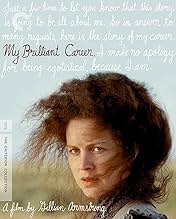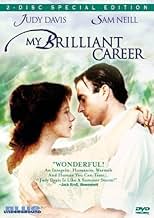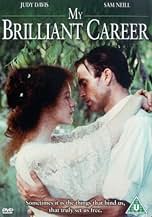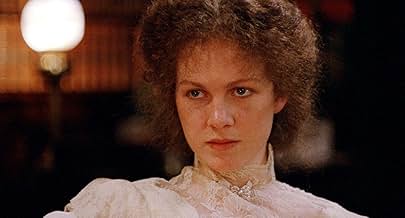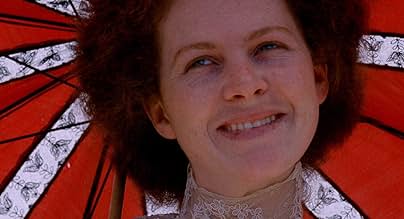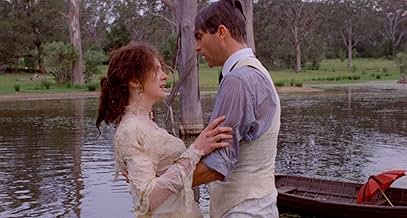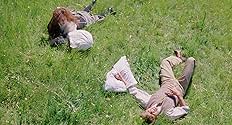VALUTAZIONE IMDb
7,1/10
5081
LA TUA VALUTAZIONE
A proud young woman in early 20th century Australia must choose between marriage and independence.A proud young woman in early 20th century Australia must choose between marriage and independence.A proud young woman in early 20th century Australia must choose between marriage and independence.
- Regia
- Sceneggiatura
- Star
- Candidato a 1 Oscar
- 11 vittorie e 8 candidature totali
Recensioni in evidenza
Judy Davis, as Sybylla Melvin, struggles with the conflicts that we all have between ambition, family, love, and guilt in a most remarkable manner. Sybylla grows to understand that life is a series of trade-offs, and that no one can have it all, and that no one can please everyone. Simple yet universal themes told with charm, wit, and a vulnerability that allows us to get right inside of her character and to understand her --- up to a point that is, a career is vital but I don't believe I'd have the strength to pass up Sam Neill under any circumstances, especially as cute as he is in this movie. In fact, all the acting is great, and the cinematography is breathtaking. Gillian Armstrong has been my idol ever since she made this magnificent film. I give it a 10.
Usually I'm not too interested in these kinds of films, but i found myself becoming involved in the characters and their lives. The movie was very well done, and it explores many of the social gender roles that are still applicable today.
It is a funny, yet serious movie, that has some deep undertones.
I would recommend watching it.
It is a funny, yet serious movie, that has some deep undertones.
I would recommend watching it.
Don't get me wrong, I like Judy Davis & I like this movie because of the nice chemistry between her and Sam Neill. Sam sure was handsome when he was younger (still looks good now too, though).
In the end I didn't get the main character because her behavior didn't make a lot of sense to me. If Sam Neill's character was an idiot I would understand, but he was about as perfect for Davis' character as she could ever hope for & her "career" didn't seem like much of a lifestyle......so her actions left me perplexed.
Still, the movie was well done & the scenery was interesting. It kept me engaged until the end....however, when the final credits rolled I was left scratching my head.
In the end I didn't get the main character because her behavior didn't make a lot of sense to me. If Sam Neill's character was an idiot I would understand, but he was about as perfect for Davis' character as she could ever hope for & her "career" didn't seem like much of a lifestyle......so her actions left me perplexed.
Still, the movie was well done & the scenery was interesting. It kept me engaged until the end....however, when the final credits rolled I was left scratching my head.
An impossibly young Judy Davis is the star of "My Brilliant Career" - the movie that started hers - a 1979 film directed by Gillian Armstrong. The story concerns Sybylla, growing up in the 1890s in the wilds of Australia who wants more from her life than marriage. She is sent to live with her grandmother, where relatives tame her wild hair, soften her coarse skin, but can't do anything about her spirit. Though she falls for a wealthy young man (Sam Neil), she is true to what her heart tells her, desiring most of all to be a writer and an independent person.
Davis does a wonderful job as Sybylla who, although headstrong, manages to make the best of whatever situation she's in. What a life for women back then. Her family can't afford to keep her, so there is pressure on her to marry or take a position. Living with her grandmother affords her some great opportunities for a better life. But when her father owes a local farmer money, she is sent to teach his illiterate children in order to work off the loan. Somehow, she turns that into a positive experience - though when you see the beginning scenes of her life there, you won't imagine she ever could. Sam Neil is very attractive and romantic as Harry, who endeavors to understand this unusual woman.
Beautifully photographed, "My Brilliant Career" is nevertheless no big, sweeping epic, and the focus stays on Sybylla, her challenges, and her determination to be, in every sense, ahead of her time.
Davis does a wonderful job as Sybylla who, although headstrong, manages to make the best of whatever situation she's in. What a life for women back then. Her family can't afford to keep her, so there is pressure on her to marry or take a position. Living with her grandmother affords her some great opportunities for a better life. But when her father owes a local farmer money, she is sent to teach his illiterate children in order to work off the loan. Somehow, she turns that into a positive experience - though when you see the beginning scenes of her life there, you won't imagine she ever could. Sam Neil is very attractive and romantic as Harry, who endeavors to understand this unusual woman.
Beautifully photographed, "My Brilliant Career" is nevertheless no big, sweeping epic, and the focus stays on Sybylla, her challenges, and her determination to be, in every sense, ahead of her time.
Sometimes a life in film brings an experience like this. Its oddly tense in some dimensions and relaxed in others and the balance between the two seems distinctly Australian. I hadn't seen this when it was new, and I'm glad. Seeing a great film for the first time is a distinct pleasure.
I can think of only two similar pleasures in life.
Reviewers often focus on the story; its the common currency for discussion. The interesting fact behind the power of this movie is that the story is incoherent, poorly developed. There are a few main characters and none of them are attached to what are considered necessities for storytelling. They aren't introduced, we see them only through the effect of their presence. They don't develop. They influence nothing.
The main character is presented as a sort of Jane Austen both an Austen woman encouraged to marry, and Austen herself as a sort of author-in-her-own-book, like we saw in the 1999 film of Mansfield Park. But the odd thing is that we have Austen in Australia, the role and all the expectations without the baroque mechanics of society swirling around. Instead we get cows and sheep.
And emptiness, a cinematic vastness that even the US hasn't yet produced, despite Terence Malick.
So the incompleteness of the story is part of the genius of the thing. Our heroine doesn't have an Austenian future, instead becomes a backcountry Louisa May Alcott or George Sand. Indeed, Davis did go on to play Sand and Anderson went on to direct "Little Women." What our filmmaker has done is create a story where we subconsciously notice something is missing. And then she fills it with two things, this translucent actress and a similarly translucent open landscape.
First the landscape. Watch the opening of this. Its genius, shooting from outside in, peering in through windows and doors while we see literally the story beginning to be written. Then we shoot from the inside through the same windows out and see a dust tempest beginning.
This notion of space, inadequate enclosure, book and heroine conflated into them and weaving through them was copied after a fashion in the opening for the 2005 "Pride and Prejudice." Here, it is fresh, original, shocking. Effective, even life-affirming.
You can see a similar master vision in how the ending is shaped. We see our woman, a best friend by this time, going to mail her book to us. She approaches the fence and her dog scurries under, unconstrained by fences. Its a small thing, but by then we've become aware of how wonderfully our hidden woman behind the camera has shaped everything so minutely. That dog moves under the gate naturally, using a gait and hole that can only have come through hundreds of such exits. I have no idea how Anderson did it.
And now to Ms. Davis. Over time you pick things from the film vocabulary that you cleave to, things that naturally tip into the bucket of your soul. One of these for me is a certain type of folded acting I've noticed in Australian actresses. Blanchett, Winslet are the ones I follow deeply.
But you can see it here and I imagine that this is the first appearance of the style in a competent film. In my own historiography, Judy Davis invented it and does so here. If you watch her manner, you can see Cate. The style is what I call folded, where we get both the character and a higher level communication from the actor about the character.
We have a few folded actresses. What's even rarer is when the actress is intelligent and skilled enough to place that higher fold in the center of the filmmaker's intention. It happens here. Its beautiful, on a simpler level echoing the fact that we see a book, its making, and various considerations about the making of the book.
Because it is this sort of translucent folding, we see Cate when we see Judy.
You won't soon forget that.
I'm putting this on my list of films you really must see. Readers may be shocked. I only allow myself two from any given years and this year gave us "Alien," "Apocalypse Now," "Manhattan," and "Tree of Wooden Clogs," all of which are bumped by this. But this will change you, a female Herzog, unHerzog.
Now if I can only see "High Tide."
Ted's Evaluation -- 4 of 3: Every cineliterate person should experience this.
I can think of only two similar pleasures in life.
Reviewers often focus on the story; its the common currency for discussion. The interesting fact behind the power of this movie is that the story is incoherent, poorly developed. There are a few main characters and none of them are attached to what are considered necessities for storytelling. They aren't introduced, we see them only through the effect of their presence. They don't develop. They influence nothing.
The main character is presented as a sort of Jane Austen both an Austen woman encouraged to marry, and Austen herself as a sort of author-in-her-own-book, like we saw in the 1999 film of Mansfield Park. But the odd thing is that we have Austen in Australia, the role and all the expectations without the baroque mechanics of society swirling around. Instead we get cows and sheep.
And emptiness, a cinematic vastness that even the US hasn't yet produced, despite Terence Malick.
So the incompleteness of the story is part of the genius of the thing. Our heroine doesn't have an Austenian future, instead becomes a backcountry Louisa May Alcott or George Sand. Indeed, Davis did go on to play Sand and Anderson went on to direct "Little Women." What our filmmaker has done is create a story where we subconsciously notice something is missing. And then she fills it with two things, this translucent actress and a similarly translucent open landscape.
First the landscape. Watch the opening of this. Its genius, shooting from outside in, peering in through windows and doors while we see literally the story beginning to be written. Then we shoot from the inside through the same windows out and see a dust tempest beginning.
This notion of space, inadequate enclosure, book and heroine conflated into them and weaving through them was copied after a fashion in the opening for the 2005 "Pride and Prejudice." Here, it is fresh, original, shocking. Effective, even life-affirming.
You can see a similar master vision in how the ending is shaped. We see our woman, a best friend by this time, going to mail her book to us. She approaches the fence and her dog scurries under, unconstrained by fences. Its a small thing, but by then we've become aware of how wonderfully our hidden woman behind the camera has shaped everything so minutely. That dog moves under the gate naturally, using a gait and hole that can only have come through hundreds of such exits. I have no idea how Anderson did it.
And now to Ms. Davis. Over time you pick things from the film vocabulary that you cleave to, things that naturally tip into the bucket of your soul. One of these for me is a certain type of folded acting I've noticed in Australian actresses. Blanchett, Winslet are the ones I follow deeply.
But you can see it here and I imagine that this is the first appearance of the style in a competent film. In my own historiography, Judy Davis invented it and does so here. If you watch her manner, you can see Cate. The style is what I call folded, where we get both the character and a higher level communication from the actor about the character.
We have a few folded actresses. What's even rarer is when the actress is intelligent and skilled enough to place that higher fold in the center of the filmmaker's intention. It happens here. Its beautiful, on a simpler level echoing the fact that we see a book, its making, and various considerations about the making of the book.
Because it is this sort of translucent folding, we see Cate when we see Judy.
You won't soon forget that.
I'm putting this on my list of films you really must see. Readers may be shocked. I only allow myself two from any given years and this year gave us "Alien," "Apocalypse Now," "Manhattan," and "Tree of Wooden Clogs," all of which are bumped by this. But this will change you, a female Herzog, unHerzog.
Now if I can only see "High Tide."
Ted's Evaluation -- 4 of 3: Every cineliterate person should experience this.
Lo sapevi?
- QuizJudy Davis learned the piano for her role in this film and played her own piano solos. Davis is credited for piano playing in the closing credits.
- Citazioni
[first lines]
Sybylla: Possum Gully, Australia. 1897. Dear fellow countrymen, just a few lines to let you know that this story is going to be all about me. So, in answer to many requests, here is the story of my career... here is the story, of my career... my *brilliant* career. I make no apology for being egotistical... because I am!
- ConnessioniFeatured in Ciné regards: Judy Davis (1980)
I più visti
Accedi per valutare e creare un elenco di titoli salvati per ottenere consigli personalizzati
- How long is My Brilliant Career?Powered by Alexa
Dettagli
- Data di uscita
- Paese di origine
- Lingua
- Celebre anche come
- My Brilliant Career
- Luoghi delle riprese
- Aziende produttrici
- Vedi altri crediti dell’azienda su IMDbPro
Botteghino
- Budget
- 800.000 A$ (previsto)
- Tempo di esecuzione1 ora 40 minuti
- Mix di suoni
- Proporzioni
- 1.85 : 1
Contribuisci a questa pagina
Suggerisci una modifica o aggiungi i contenuti mancanti

Divario superiore
By what name was La mia brillante carriera (1979) officially released in India in English?
Rispondi

